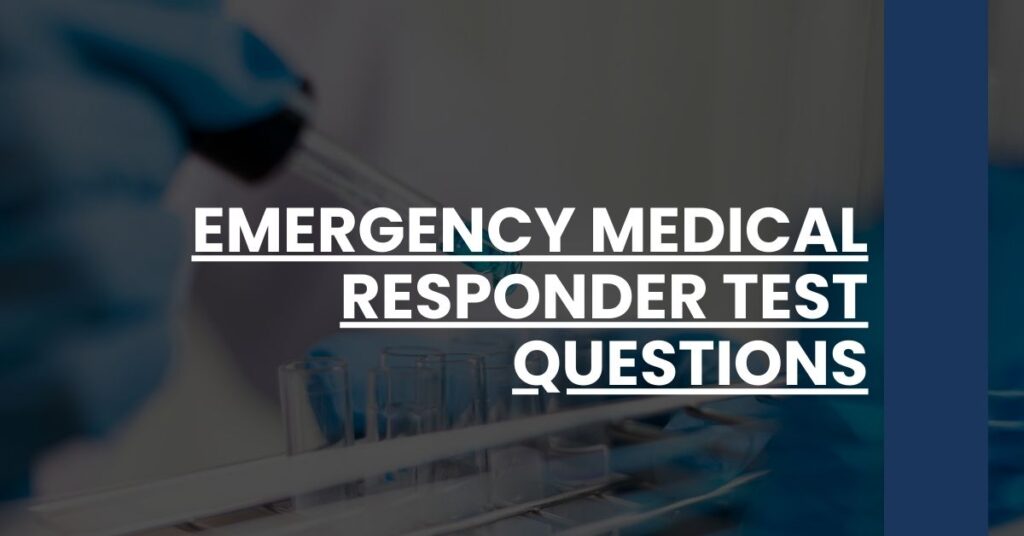Emergency medical responder test questions prep is your first step to a vital career.
- Realistic Practice: Simulate the actual exam conditions with authentic question formats.
- Key Topics Mastery: Ensure you understand every essential topic category covered.
- Confidence Building: Build the test-taking confidence you need through targeted practice.
Ace your emergency medical responder test questions today.
- Understanding the EMR Certification Exam
- Types of Questions to Expect on the EMR Exam
- Essential Study Topics for the EMR Test
- Preparing for the EMR Test: Effective Study Tips
- Sample EMR Test Questions and Explanations
- Common Pitfalls and How to Avoid Them
- Test Day Strategies for Success
- Taking the Next Steps After the EMR Test
- Conclusion: Ready for Action
Understanding the EMR Certification Exam
The role of an Emergency Medical Responder (EMR) is both noble and vital, providing immediate care in the critical first moments of emergency situations. If you’re looking to launch your career in emergency medical services, passing the EMR certification exam is your first significant milestone.
The Structure of the Exam
The EMR certification exam is designed to assess your knowledge and capabilities as a responder. It typically involves a combination of multiple-choice questions and practical skills assessments, aimed at evaluating your readiness to perform under pressure. For those stepping into this career, it’s essential to grasp both the cognitive and psychomotor skills required in real-world emergencies.
The Importance of EMR Certification
Certification verifies that you’ve met the national standard for the knowledge and skills necessary to provide prehospital care at the responder level. As an EMR, you form the backbone of emergency response, whether as a volunteer or a professional stepping stone toward advanced prehospital roles.
Starting Your Career Path
Successful certification as an EMR opens doors to various opportunities in the healthcare and public safety domains. Being certified signals to employers that you are ready and able to take on the responsibilities that come with being the first line of support in emergencies.
Types of Questions to Expect on the EMR Exam
Understanding the types of questions you’ll encounter is crucial in preparing for your EMR exam. Multiple-choice questions will test your knowledge across different scenarios, while true/false questions may assess your ability to discern medical facts quickly.
Formats that Challenge Your Decision-Making
Expect a majority of the exam to consist of multiple-choice items, each carefully crafted to challenge your ability to apply knowledge to emergency scenarios. This means you’ll have to think on your feet, much like in real-life situations where quick, informed decisions can make all the difference.
Essential Study Topics for the EMR Test
The EMR exam covers a breadth of knowledge that reflects the diverse situations emergency medical responders might face. Be prepared to showcase your proficiency across several critical domains.
Airway, Breathing, and Circulation: Vital signs and the ABCs are fundamental to any medical response.
- Cardiac Emergencies: From CPR techniques to the use of AEDs, you need a solid understanding of cardiology.
- Trauma: A variety of injuries can occur in emergencies, making trauma care a pivotal study topic.
- Medical and Obstetric Emergencies: Beyond the injuries, you’ll need to be knowledgeable about medical conditions and childbirth situations that could arise.
- Behavioral and Environmental Emergencies: Mental health crises and environmental impacts on health can’t be overlooked.
Resources like Varsity Tutors offer a glimpse into the types of content you need to master, including respiration, cardiology, trauma, and obstetrics, among others.
Preparing for the EMR Test: Effective Study Tips
Preparation is key, and with the right strategies, you can navigate through your studies with confidence. Here are some tips to ensure you are well-equipped for the EMR test.
- Create a Study Plan: Divide the content areas into manageable sections and designate time for each, ensuring thorough coverage.
- Utilize Recommended Study Guides: Official guides such as the EMR Recertification Guide provides a framework aligning with the content of the exam.
- Incorporate Practice Tests: Gauge your readiness and get comfortable with the format by taking practice tests.
- Form a Study Group: Collaborating with peers can provide different perspectives and clarification on challenging concepts.
Organizing and pacing your study sessions will minimize stress and maximize retention. Remember, a well-planned study routine is as critical to your success as the content itself.
Sample EMR Test Questions and Explanations
Preparing for the Emergency Medical Responder certification exam can be daunting, but practicing with sample questions is a great way to build confidence and competence. Let’s dive into some sample EMR test questions, their answer choices, and detailed explanations that clarify the reasoning behind the correct answers. Your ability to understand and tackle these samples indicates your readiness to handle the real emergency medical responder test questions.
EMR Practice Question 1
Scenario: You arrive on the scene where an adult patient appears to be unconscious. After ensuring scene safety, which of the following should you do first?
- Check the patient’s airway for obstruction.
- Begin chest compressions.
- Assess the patient’s breathing.
- Apply high-flow oxygen.
Correct Answer: 1. Check the patient’s airway for obstruction.
Explanation: The first step in the emergency patient care algorithm is to ensure the airway is clear. An obstructed airway can lead to hypoxia and is a life-threatening condition. Chest compressions and applying oxygen come later in the sequence of patient care after airway assessment and confirmation of breathing status.
EMR Practice Question 2
Situation: When assessing a patient with a suspected stroke, which assessment tool is most appropriate?
- AVPU scale
- Cincinnati Prehospital Stroke Scale
- Glasgow Coma Scale
- SAMPLE history
Correct Answer: 2. Cincinnati Prehospital Stroke Scale
Explanation: The Cincinnati Prehospital Stroke Scale is specifically designed to help emergency responders identify the signs of a stroke quickly and effectively. This tool directs you to look for facial droop, arm drift, and abnormalities in speech – the common stroke indicators.
EMR Practice Question 3
Situation: You respond to a 7-year-old female with difficulty breathing. Her skin is pink, warm, and dry. She is able to speak in full sentences. What is your first action?
- Perform a primary assessment.
- Provide ventilatory support.
- Administer epinephrine.
- Obtain medical history from the parents.
Correct Answer: 1. Perform a primary assessment.
Explanation: Performing a primary assessment allows you to determine the nature and severity of the breathing difficulty. The description of her skin color and ability to speak in full sentences indicates that she is not in immediate respiratory distress, thus ventilatory support or epinephrine administration is not warranted at this point. History can be obtained after the initial assessment.
Common Pitfalls and How to Avoid Them
Even the most studious candidates can encounter common mistakes while taking their EMR certification exam. Let’s navigate through these pitfalls, so you can approach your exam with the right mindset.
- Overthinking Questions: Stay grounded in your training; remember, the exam’s aim is to assess your ability to make practical decisions.
- Second-Guessing: Trust your first instinct, as initial answers are often correct.
- Mismanaging Time: Allocate your exam time appropriately and avoid spending too much time on any one question.
Maintain a calm and focused approach while you tackle those emergency medical responder test questions, and remember, thorough preparation is the key to successfully avoiding these common pitfalls.
Test Day Strategies for Success
When it’s time to take the EMR exam, your mindset and strategy can be just as important as the knowledge you’ve accumulated. Here are some methods to ensure you’re adopting the best approach to test day.
Leading Up to the Exam
- Ensure ample sleep the night before and have a nutritious meal ready for the day of your exam.
- Review any core materials or quick notes, but avoid cramming.
In the Exam Room
- Read each question carefully and watch for details that guide you to the correct answer.
- Manage your time well, giving each question its due attention without lingering too long.
A positive approach, trust in your preparation, and strategic thinking will guide you through the exam process with poise and confidence.
Taking the Next Steps After the EMR Test
Passing the EMR test is a significant milestone on your pathway to a career in prehospital emergency care. But what happens post-examination?
The journey doesn’t end with certification. It’s merely a starting point. You should consider obtaining your official certification, exploring further education opportunities to advance your career as a medical professional, and beginning the job search in the ever-evolving emergency services field.
Conclusion: Ready for Action
As we wrap up this exploration into the emergency medical responder test questions, remember that the value of diligence in your studies cannot be overstated. Your tireless preparation, coupled with practical test strategies, will pay dividends when faced with the pressure of the exam. Your quest to become an EMR doesn’t conclude with the test – it’s a promise to embark on a career of lifelong learning and dedication to helping others in their most critical times of need. So take a deep breath, trust in your training, and step forward with confidence – you’re ready for this!
Explore essential emergency medical responder test questions to prepare for your EMR certification exam with confidence and expertise.

